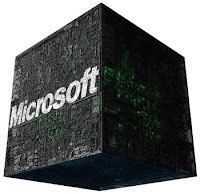The Microsoft millstone around our necks
 As I noted in my last post Microsoft has given permission so that PC vendors can allow buyers (both corporate and retail) to substitute Windows XP for Windows Vista when making a new computer purchase. That fact alone should send every anti-trust watchdog into a rabies-like foam-flecked-about-the-mouth attack-mode straight for Microsoft's jugular. Why doesn't it?
As I noted in my last post Microsoft has given permission so that PC vendors can allow buyers (both corporate and retail) to substitute Windows XP for Windows Vista when making a new computer purchase. That fact alone should send every anti-trust watchdog into a rabies-like foam-flecked-about-the-mouth attack-mode straight for Microsoft's jugular. Why doesn't it?This total lack of real competition in the OS market forces the consumer to chose Microsoft's earlier offering rather than going to another vendor. Imagine for a moment if there were only one computer manufacturer, and you were forced to buy last year's notebook or desktop system because this year's model was completely unsuited. That actually happened with the IBM PS/2, and the market voted by purchasing Compaq and HP and others at the time. Today we have a wealth of manufacturers with varying models, and even the processor market has real measurable competition between Intel and AMD. Yet we have only one OS to run on all these systems; Microsoft. We allow Microsoft to continue its lock on the OS market (and the productivity market as a further consequence) because Microsoft has successfully brainwashed us, through it's marketing, into accepting the current situation.
Microsoft furthers its monopolistic lock by hiding critical interfaces to its products and systems. Those interfaces include data definitions, such as the data structures in all its Office documents (Word, Excel, PowerPoint, and Visio). Without unencumbered and clearly defined interface definitions, the cost of interoperability with any Microsoft system becomes prohibitively expensive. Microsoft adds costs by forcing non-disclosure agreements (NDAs) to be signed, and Microsoft will only sign an NDA with a company it deems as non-competitive and integral with its existing product line. Further, Microsoft charges for access to its interface definitions. Finally, Microsoft's IDDs, like the software it documents, are bloated and overly complicated to the point of incomprehensibility.
My personal preferences notwithstanding, Linux is not a commercially viable desktop alternative to Windows on the Intel platform. Most vendors won't touch it because of decades of Microsoft PR and the fear of angering Microsoft if they do. What few companies that do offer Linux are too small for Microsoft to care about or big enough to keep them at arms length. Even then their offers are extremely limited.
Dell's offering of Ubuntu is an excellent example of how limited the choices still are. Dell's site only offers three systems, limited to only one distribution, Ubuntu. I can't go to any other part of Dell's site to order any of their systems with the Linux distribution of my choice, let alone Ubuntu. I certainly have my choices of which version of Windows I would like to install on those systems, but as I noted above, choices of a Windows version is no choice at all. Instead I have to navigate to their special site and place my order.
We're going nowhere fighting Microsoft the way we are now. And until somebody big enough really stands up and slaps Microsoft down, we never will.

Comments
Post a Comment
All comments are checked. Comment SPAM will be blocked and deleted.